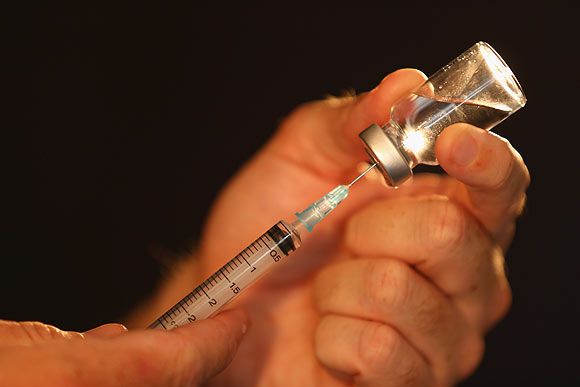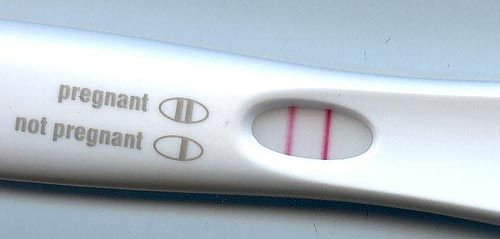 | « Back to article | Print this article |
It could ease the burden on the 225 million women in developing countries, says Ari Altstedter.

Doctors are on the cusp of launching a male contraceptive.
But rather than a big pharma lab, the breakthrough is emerging from a university start-up in the heart of rural India.
Years of human trials on the injectable, sperm-zapping product are coming to an end, and researchers are preparing to submit it for regulatory approval.
Results so far show it’s safe, effective and easy to use -- but gaining little traction with drugmakers. That’s frustrating its inventor, who says his technique could play a crucial role in condom-averse populations.
A new birth control method for men has the potential to win as much as half the $10 billion market for female contraceptives worldwide; it also has the potential to cut into the $3.2 billion of annual condom sales, businesses dominated by pharmaceutical giants Bayer AG, Pfizer Inc and Merck & Co, according to estimates from the last major drug company to explore the area.
India’s reversible procedure could cost as little as $10 in poor countries, and may provide males with years-long fertility control, overcoming compliance problems and avoiding ongoing costs associated with condoms and the female birth-control pill, which is usually taken daily.
 It could also ease the burden on the 225 million women in developing countries who, the World Health Organisation says, have an unmet need for contraception.
It could also ease the burden on the 225 million women in developing countries who, the World Health Organisation says, have an unmet need for contraception.
Yet, so far, only a US non-profit has taken up development of the technology abroad.
For Sujoy Guha, the 76-year-old biomedical engineer who invented the product, the challenge is to now find a company which wants to sell it -- even though male contraception is an area Big Pharma has so far shown little interest in.
“The fact that the big companies are run by white, middle-aged males who have the same feeling -- that they would never do it -- plays a major role,” said Herjan Coelingh Bennink, a gynaecology professor who helped develop the contraceptives Implanon and Cerazette as head of research and development in women’s health for Organon International from 1987 to 2000.
“If those companies were run by women, it would be totally different.”
Guha’s technique for impairing male fertility relies on a polymer gel that’s injected into the sperm-carrying tubes in the scrotum.
The gel, which has the consistency of melted chocolate, carries a positive charge that acts as a buffer on negatively charged sperm, damaging their heads and tails, and rendering them infertile.
The treatment, known as reversible inhibition of sperm under guidance, or RISUG, is reversed with a second shot that breaks down the gel, allowing sperm to reach the penis normally.
The expected launch of RISUG over the next two years will contribute to the Indian contraceptive market’s 17 percent growth through 2021, according to a report last year from Pharmaion Consultants, based near New Delhi.
The procedure is 98 per cent effective at preventing pregnancy -- about the same as condoms if they are used every time -- and has no major side effects, according to R S Sharma, head of reproductive biology and maternal health at the Indian Council of Medical Research.
About 540 men have received it in India, where it continues to prevent pregnancies in their partners 13 years after treatment, he said.
A submission to regulators this year will seek approval for RISUG as a permanent method of birth control. That will be appended with clinical data supporting reversibility, Sharma said.
India has more married women with an unmet need for family planning than any other country, and social stigma and a lack of privacy in stores has kept condom use to less than six per cent.
Globally, men tend to take a back seat in matters of contraception. Almost 60 per cent of women in spousal relationships used the contraceptive pill or some other form of modern contraception worldwide in 2015, according to a United Nations report. In contrast, eight per cent relied on their male partner using a condom.
A new option for male birth control could garner as much as half the female contraceptives market, according to research by Organon in the 1990s, when the Dutch drugmaker partnered with Germany’s Schering AG on the last major effort to develop a male birth control pill.
 Demand would come from couples in long-term relationships looking to share family-planning responsibilities and single men looking for an alternative to condoms to prevent an unintended pregnancy from casual sex, Coelingh Bennink said.
Demand would come from couples in long-term relationships looking to share family-planning responsibilities and single men looking for an alternative to condoms to prevent an unintended pregnancy from casual sex, Coelingh Bennink said.
Still, there were questions at Organon about whether it would be worthwhile financially to develop a new entrant in the low-margin contraceptives market, and the project was eventually shelved, he said.
Efforts on a hormone-based male contraceptive continued in 2008, in a study co-funded by the Bill & Melinda Gates Foundation and UN agencies that was published in October.
While the injected regimen’s efficacy was ‘relatively good’ compared to other methods, the study was terminated early after a safety review.
The authors noted a ‘relatively high’ frequency of mild to moderate mood disorders, sparking a media uproar over perceived double standards in the development of contraceptives because the side effects seemed similar to those women experience on the pill.
